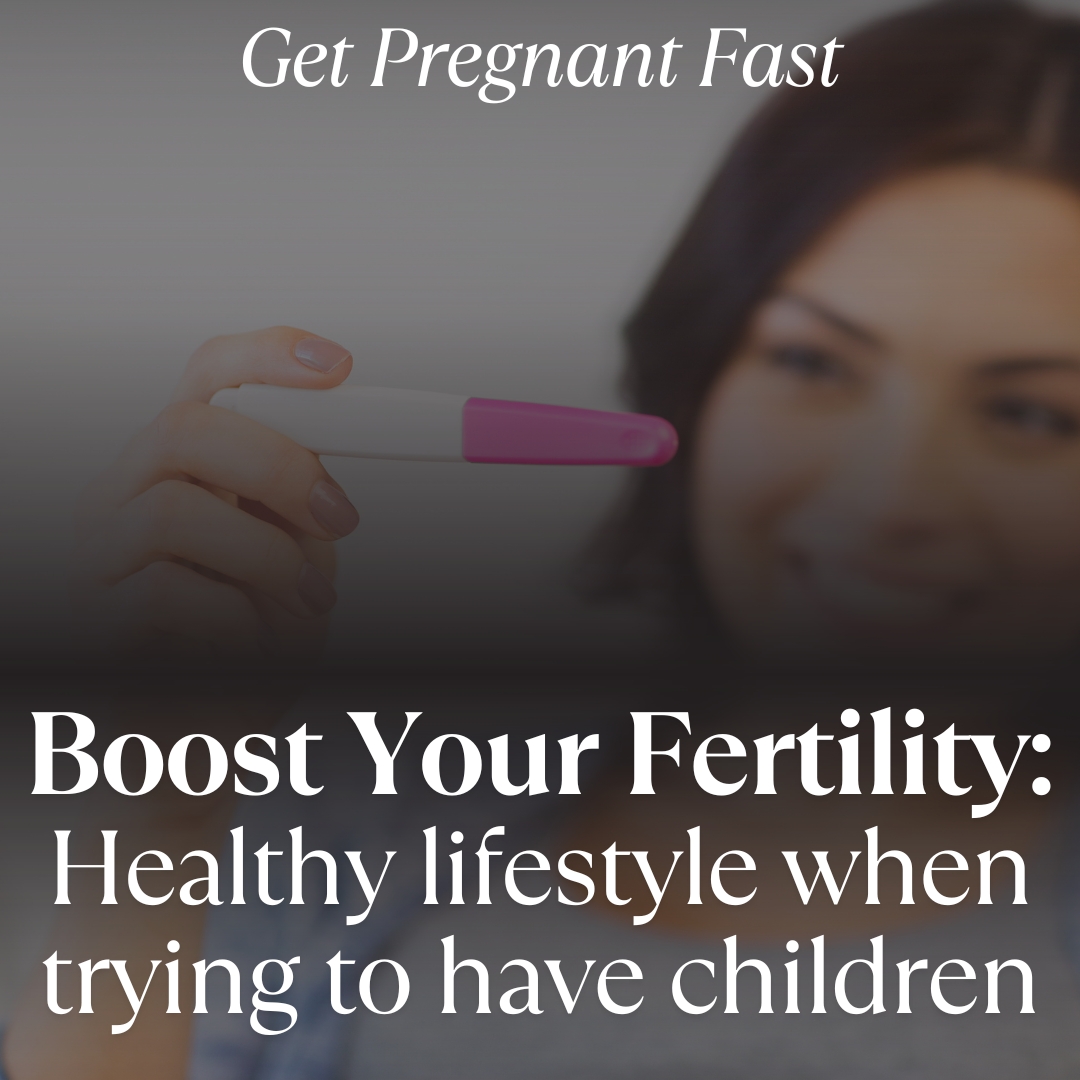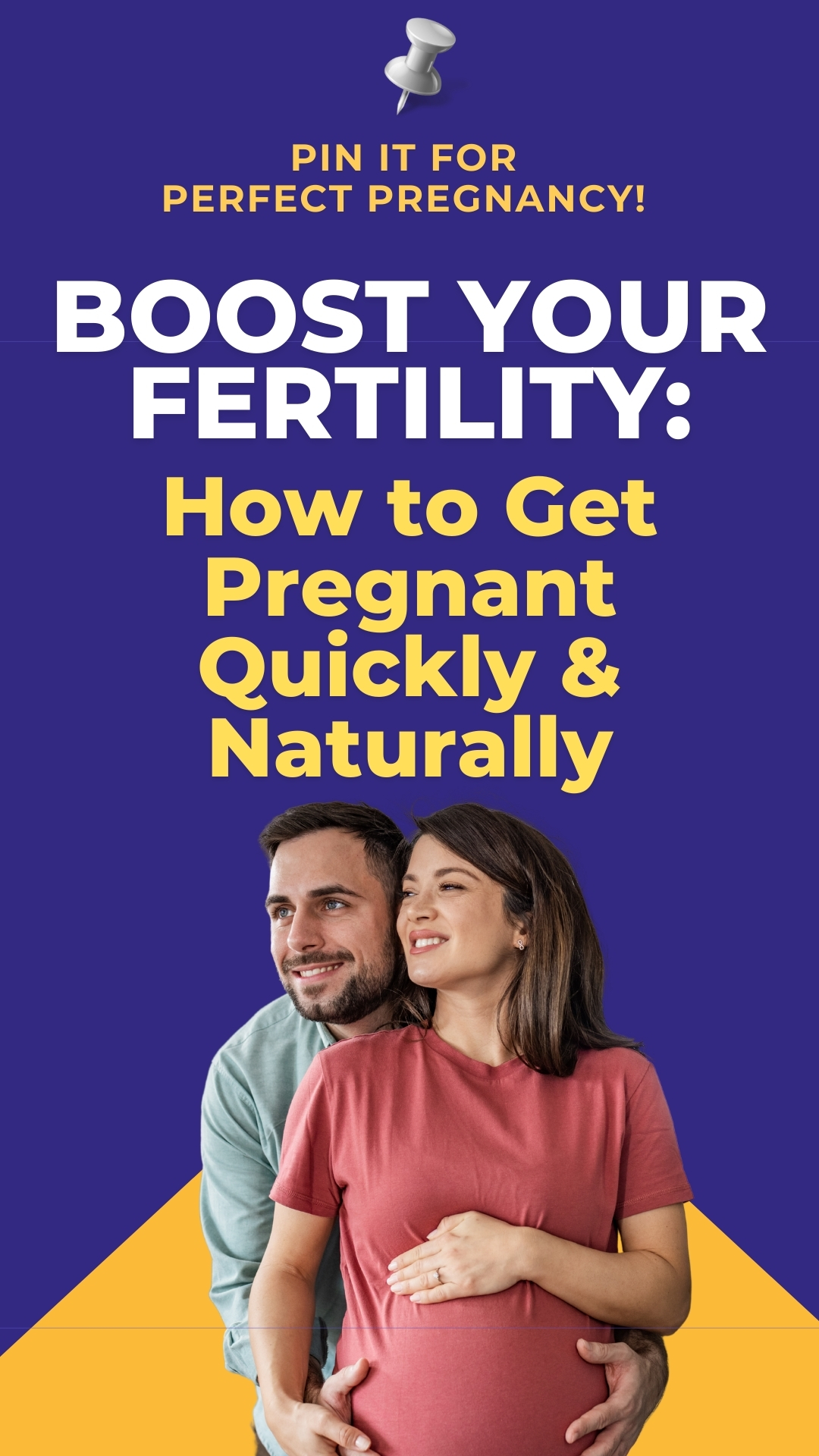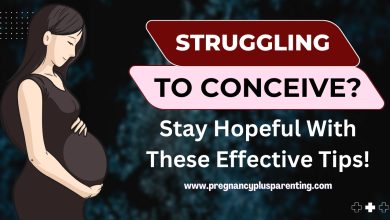Boost Your Fertility: How to Get Pregnant Quickly & Naturally
You really want to have a baby and waiting is the last thing you want to do.
Although Mother Nature and the right timing play an important role, there are tips for getting pregnant that support natural family planning.
Your unfulfilled desire to have children is driving you forward and you are most likely now dealing with many questions surrounding becoming pregnant.
Have you heard or read that there are things you can do to help you get pregnant?
How can you get pregnant faster?
To get pregnant faster, the best thing you can do is get to know your body, especially your cycle.
But other factors also play an important role and can increase the likelihood of conception.
In our article you will find out what tricks there are to get pregnant and how you can fulfill your potential as a mother .
Getting pregnant naturally – tips
To avoid falling into deep sadness because you didn’t get pregnant the first time, you need to know that many couples have difficulty getting pregnant and it can take many months before they succeed.
Artificial insemination is also possible, but only for couples who cannot fulfill their desire to have children naturally due to health reasons.
Are there things you can do to get pregnant faster?
Absolutely, but they don’t always work for every couple. Don’t blame yourself, because getting pregnant isn’t something you can plan exactly, and many factors have to align for it to work.
If you consider a few factors, the good news is that there are a number of things you can do to fulfill your desire to have children.
When are your fertile days?
The basis for natural family planning is knowing when your fertile days are during your cycle.
You need to get to know your body to know exactly when you ovulate (when a mature egg is released from the ovary).

For many women, the cycle varies and although ovulation typically occurs about 14 days before the start of the next period, there is no fixed rule.
To know when your best chance of getting pregnant is, you need to listen to your body.
Consider age
The fact is that fertility decreases with age and the current career path in our society means that couples are choosing to have children later and later.
Statistically, women are most fertile up to the age of 25, and as they get older, the likelihood of becoming pregnant decreases while the number of miscarriages increases.
And although men can still fulfill their desire to have a baby during menopause, their sperm production and sperm quality also decline.
An examination by a gynecologist and urologist is recommended in advanced age.
Pay attention to body weight
Just as being overweight or underweight can cause various health problems, they can also affect fertility.
This means that the closer you get to a healthy weight, the greater your chance of getting pregnant.
Here, too, it must be emphasized that body weight affects not only the hormonal balance and fertility of women, but also the sperm quality of men.
A balanced diet and regular exercise can increase your chances of having a baby.
Free your body from toxins!
No less important is the fact that you have to prepare your body for the journey called pregnancy.
• Start by changing your diet and reducing your intake of toxins such as alcohol, sugar, preservatives and other toxins from food.
• Skincare products also contain toxins that your body absorbs through your skin. Check product descriptions and make sure your beauty routine doesn’t interfere with your desire to have a baby.
• Drink plenty of water or unsweetened tea. If your body isn’t adequately hydrated, it won’t be able to eliminate toxins effectively.
• Physical activity also plays a crucial role in detox. During sweating, your blood flow increases throughout your body, absorbing toxins from your organs and releasing them with the help of your liver or lungs.
Healthy lifestyle when trying to have children
Your lifestyle can have a big impact on getting pregnant.
A healthy lifestyle without alcohol and smoking, with plenty of exercise and a healthy diet can not only help you stay healthy, but also fulfill your desire to have a baby.
Smoking is a special factor in becoming pregnant because smoking negatively affects the uterine lining, which makes it difficult for a fertilized egg to implant.

In men, fertility is very dependent on temperature, so wearing tight pants, heated car seats, hot baths, saunas and other things can affect sperm quality.
1. Healthy diet
A healthy diet is always important, but especially if you want to get pregnant.
You will benefit from it health-wise and with a little luck you will finally hold the positive pregnancy test in your hands.
The nutrients you consume also affect your baby’s health.
It is nothing new that your diet needs to change during pregnancy, but a healthy and balanced diet is also important before pregnancy.
If you find it difficult to change your diet, try introducing healthy foods first before eliminating unhealthy ones.
Balanced diet before pregnancy:
• Fresh fruits and vegetables
• Carbohydrates from whole grain products such as oats, brown rice, quinoa, barley, corn and whole grain bread
• Proteins from protein sources such as meat, dairy products, nuts, beans, seeds, lentils, peas and dark leafy vegetables (spinach and broccoli)
• Fats such as those found in nuts, fish and vegetables
• Fiber from fruits, vegetables and whole grain products
• Limit salt, sugar and junk food
Please remember that you are only human and that almost no one, or at least very few people, can stick to a perfect diet plan.
It’s okay to slip up and treat yourself every now and then.
But try to eat as healthily as possible to get closer to your unfulfilled desire to have children.
2. Sport
One consistently healthy habit is definitely exercising. It makes you feel satisfied, your skin glows, and you’re overjoyed thanks to the release of estrogen.
Exercise can help you reach your ideal weight, increase your self-confidence and be active, while also bringing many other health benefits.
But as is always the case with good things in life, the same applies here – don’t overdo it.
Just like not exercising, too much exercise can also lead to you not ovulating.
But how much is too much?
It’s different for every woman and depends on whether exercise is part of your daily routine or whether you’ve only recently started a training plan.
If you’re a competitive athlete and you bleed regularly, your training plan is fine for your body, but if your bleeding stops, it means you need to slow down.
The best way to use exercise to your advantage and increase your chances of getting pregnant is to not overdo it.
Regular exercise, such as daily walking, can work wonders on the female body.
3. Reduce stress
Reducing stress and taking care of your mental well-being should always be a rule for you. Make time for things that relax and bring you joy.
Whatever it is that helps you relieve stress, it’s okay as long as it makes you feel good.
YES , stress is unavoidable these days and you can roll your eyes all you want, but less stress can actually promote ovulation.
• Meet up with friends
• Enjoy nature
• Go swimming, cycling, hiking, …
• Plan “ME TIME”
• Take a break
• Read a book
• Do sports
• Enjoy sexual intercourse
• Do whatever you want and what makes you happy!
4. Take folic acid
In consultation with your gynecologist, it is beneficial to start taking folic acid as soon as you want to have children .
What is folic acid?
Folic acid is a synthetically produced B vitamin that is essential for the healthy development of the fetus.
Folate, on the other hand, is mostly obtained from the diet, but it is not possible to measure exactly how much folate you get from the diet.
If you are planning a pregnancy, it is advisable to take folic acid at least one month before pregnancy.
Since folate plays an important role in cell division, the need for folate increases during pregnancy.
Folic acid (artificially produced folate) is essential in the first three months of pregnancy and should be taken in the form of a dietary supplement to prevent neural tube defects (such as spina bifida).
Stop using contraceptives
If you use contraception, you should stop using it in good time if you want to have children.
If your contraceptive method is the pill, you should expect it to take a few months for your hormone levels to return to normal.
When using contraceptives, you should also be aware that it is difficult to track ovulation after stopping.
This means that you could become pregnant before your period, which makes it difficult to calculate your due date.
Gynecologist examination
Before you officially try to get pregnant, you should have a check-up with your gynecologist.
Especially if there are any underlying health problems that are under special control during pregnancy.
Your gynecologist will not only examine you to rule out health-related factors that could stand in the way of your desired child.
He or she will also advise you, probably prescribe folic acid, answer your questions, and discuss any concerns you may have.
You will also need to check your vaccination status, as chickenpox and rubella can be very dangerous during pregnancy.
Your partner should also make an appointment with the doctor!
If your desire to have a baby is not working out, it is advisable for your partner to also have a check-up with a urologist regarding sperm production and sperm quality.
Choosing the right time to get pregnant
The process when an egg is released from the ovary is called ovulation.
After the egg is released, it travels through the fallopian tube for about 5 days and if there are sperm in the fallopian tube at that time, the egg can be fertilized.
The most fertile days are the three days before ovulation and the day of ovulation.
This means that technically the best chances of pregnancy are only during this period.
So if you have sex three days before ovulation and on the day of ovulation, there is an increased chance of fertilization and implantation of the egg.
Determine ovulation and fertile days
Since observing your fertile days increases your chances of getting pregnant, it makes sense to get to know your body and its rhythm.
There are many methods you can use to track your fertile days.
Some methods are more effective than others, while others work best when used in combination.
Here I would like to introduce you to various methods, apps and pregnancy tips that will make it easier for you to get pregnant quickly.
1. Determine ovulation thanks to your cycle
Monitoring your cycle (the Klaneder method) plays a crucial role if you want to get pregnant.
To be able to determine ovulation at the right time, you need to know your cycle well.
Knowing when you ovulate and are most fertile can help you know when to focus on intercourse.
There are various signs your body uses to signal when ovulation is occurring, such as changes in cervical mucus.
Assuming you do not suffer from any menstrual irregularities and your cycle lasts an average of 28 days, according to clinical guidelines you are most fertile between the 10th and 17th day of your cycle.
What does it mean if ovulation occurs 14 days before the next period?
Since new studies have shown that various factors, such as stress, sleep and diet, influence the day of ovulation, ovulation is difficult to determine even in women with regular cycles.
However, there are other fertility signs that, when combined with this calculation, can help you determine your fertility status.
2. Ovulation Calculator – Ovulation Apps
There are also many different apps that make tracking your cycle a breeze.
These apps usually have a built-in ovulation calculator that can roughly predict your next fertile days.
3. Track cervical mucus
Cervical mucus is secreted by glands located around the cervix.
Its purpose is to prevent things like bacteria, etc., from entering the uterus on non-fertile days.
However, during the fertile days, the cervical mucus has the task of nourishing sperm and transporting them into the uterus.
If you pay close attention to your cervical mucus, you will notice that it changes in texture, color, and quantity throughout your cycle.
At the time of ovulation, your cervical mucus is more watery, thinner and clearer, resembling raw egg whites, while during the non-fertile period it is dry and sticky.
The pH of your cervical mucus changes and becomes more acidic during your fertile days, which sperm appreciate.
It’s important to note that medications, stress, hygiene products, and lubricants can all change the appearance of your cervical mucus. Cervical mucus may also be slightly different during breastfeeding.
4. Track basal body temperature
Basal body temperature is your body temperature in the morning immediately after waking up.
Since your basal body temperature changes throughout your cycle, you can use this method to determine the day of ovulation.
Typically, body temperature is slightly lower before ovulation and higher after ovulation and remains this way for about two weeks.
If you measure your temperature every morning after getting up for at least three months, you will find out useful information about your ovulation and be able to make a more accurate prediction of your fertile days.
5. Ovulationstests
Similar to a pregnancy test, ovulation tests measure your hormone levels and show a specific color when those levels rise.
If you take an ovulation test 5 days in a row, about 17 days before your next period, you will probably be able to catch and predict your ovulation.
If an ovulation test predicts that you are ovulating, it is recommended that you have sex every day for the next two to three days.
Sexual intercourse at the right time
Since your fertile days span a period of 6 days—5 days before ovulation and the day of ovulation—tracking your fertile days can help you know exactly when to have sex.
And although there are no definitive studies that show that certain positions increase the chance of pregnancy, there’s nothing wrong with trying.
Here I would like to give you some tips on getting pregnant that might increase your chances of getting pregnant.
1. In which position do you get pregnant faster?
You shouldn’t worry too much about certain positions.
There are many myths circulating about different positions, but there is no scientific evidence and no general answer as to which positions promote fertilization.
But certain positions, such as the cowgirl position, fight with gravity and make it difficult for sperm to travel upstream.
2. Stay in bed immediately after intercourse?
Again, there is no evidence that the likelihood of pregnancy increases, but there is nothing wrong with staying in bed for a few minutes after intercourse instead of going straight to the toilet.
3. Don’t overdo it!
Having sex every day can be tiring and stressful.
It is important to note that sperm can survive in the body for 5 days, so having sex every other day during your fertile days is perfectly fine.
The important thing is that you enjoy it and approach the whole thing (as relaxed as possible).
When to see a doctor?
Most couples who have frequent unprotected sex become pregnant within six months.
If you are older than 35, have been trying to have children for more than six months, or suspect fertility problems, it is advisable to contact your gynecologist.
However, infertility does not only affect women, men are also affected, so a visit to the urologist is also necessary.
If a suspicion of fertility problems is confirmed, a fertility specialist and artificial insemination can help, if necessary, and fulfill your unfulfilled desire to have children as a couple.
Final thoughts
For many couples, finally being able to hold a child in their arms is the fulfillment of all their dreams.
As you have read, there are tips for getting pregnant that are within your power and that you can use without a doctor to increase your chances of getting pregnant.
Most tips require discipline and don’t offer quick fixes. Also, keep in mind that even a small change can make a big difference. Many people also swear by chasteberry.
A combination of different changes usually brings great results, but you shouldn’t overdo any advice.
I wish you good luck with your attempts and that you can soon hold your dream child in your arms.







